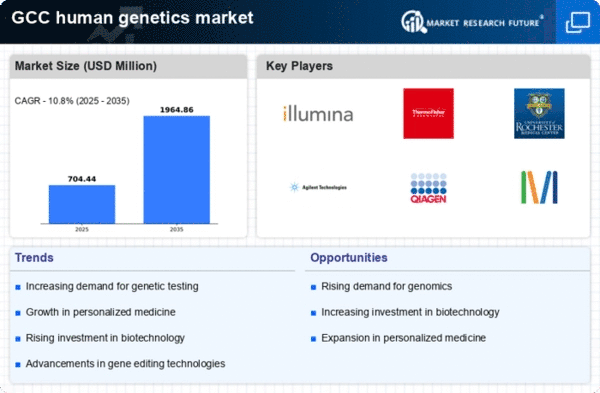Advancements in Genomic Technologies
Technological innovations in genomics are significantly influencing the human genetics market. The advent of next-generation sequencing (NGS) and CRISPR technology has revolutionized genetic research and testing capabilities. These advancements enable faster, more accurate, and cost-effective genetic analyses, which are essential for both clinical and research applications. In the GCC, the market for genomic technologies is projected to grow at a CAGR of over 15% through 2027, driven by increased investments in biotechnology and healthcare infrastructure. As these technologies become more accessible, they are likely to enhance the precision of genetic testing and personalized medicine, thereby expanding the human genetics market. The integration of artificial intelligence in genomic data analysis further augments the potential for breakthroughs in understanding genetic diseases.
Growing Public Awareness and Education
Public awareness regarding the importance of genetics in health and disease is steadily increasing in the GCC. Educational initiatives and campaigns aimed at informing the population about genetic testing and its benefits are gaining traction. This heightened awareness is likely to lead to a greater acceptance of genetic testing among the public, thereby driving demand in the human genetics market. Surveys indicate that approximately 60% of individuals in the region are now aware of genetic testing options, a significant increase from previous years. As more people understand the implications of genetic information for personalized healthcare, the market is expected to expand. This trend underscores the importance of education in fostering a supportive environment for genetic research and testing.
Increasing Prevalence of Genetic Disorders
The rising incidence of genetic disorders in the GCC region is a crucial driver for the human genetics market. As awareness of these conditions grows, healthcare providers and patients are increasingly seeking genetic testing and counseling services. Reports indicate that genetic disorders affect approximately 1 in 300 births in the region, leading to a heightened demand for diagnostic solutions. This trend is likely to stimulate investments in genetic research and testing facilities, thereby expanding the market. Furthermore, the increasing prevalence of lifestyle-related diseases, which may have genetic components, further emphasizes the need for genetic insights. Consequently, the human genetics market is poised for growth as stakeholders respond to the urgent need for effective diagnostic and therapeutic options.
Regulatory Support and Framework Development
The establishment of supportive regulatory frameworks in the GCC is a vital driver for the human genetics market. Governments in the region are increasingly recognizing the importance of genetic research and its potential to improve healthcare outcomes. Initiatives aimed at developing clear guidelines for genetic testing and research are being implemented, which may enhance the credibility and reliability of genetic services. For instance, the introduction of regulations governing genetic data privacy and ethical considerations is likely to foster public trust in genetic testing. As regulatory bodies work to create a conducive environment for innovation, the human genetics market is expected to benefit from increased investment and collaboration among stakeholders, including healthcare providers, researchers, and technology developers.
Rising Investment in Biotechnology and Research
Investment in biotechnology and genetic research is on the rise in the GCC, serving as a significant driver for the human genetics market. Governments and private entities are channeling funds into research initiatives aimed at understanding genetic diseases and developing innovative therapies. Reports suggest that the biotechnology sector in the GCC is expected to reach a valuation of $10 billion by 2026, with a substantial portion allocated to genetic research. This influx of capital is likely to accelerate advancements in genetic testing technologies and therapeutic solutions. As research institutions collaborate with healthcare providers, the human genetics market is poised for expansion, driven by the need for effective interventions and personalized medicine solutions.

















